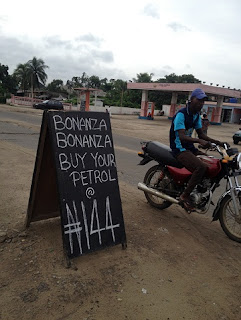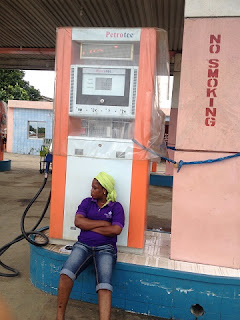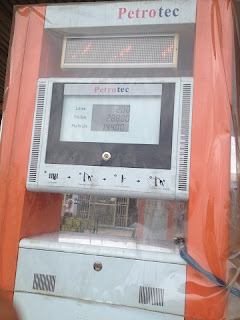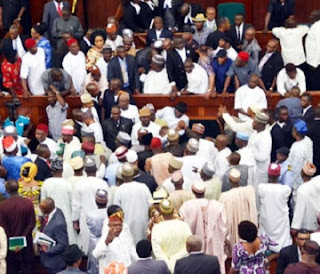Choice of Freedom Over Servitude: Issues And Concern Over New N145 Petrol Pump Price, By AbdulRahman Agboola
As core loyalists of the present administration of President Muhammadu Buhari, in the face of diverse reactions over the petrol pump price recently announced by the Federal Government, silence would have been golden, especially when other co-loyalists have declared their unalloyed support to the policy, but our background doesn’t permit neutrality, we strongly align with the maxim that states that the darkest places in hell are reserved for those who maintain their neutrality in times of moral crisis.
Expressing views, thoughts and actions at variance with allies could be catastrophic to long built relationships, but leaning towards truth and conscientious deeds provides succor when arguments that could hamper friendship surface and the wave of the moment is a pointer towards that direction, but the beauty of the World is that, Allies today, Enemies tomorrow, the World is a complex place.
It is a common fact that most Nigerians don’t understand the workings of democracy, instead of dissecting issues as it relates to public good, they have too much respect for affinity with people in power and not to be regarded as antagonists, they often admit government policies hook line and sinker, mostly when relationship exist and the rest of the people are declared as opposition whose opinions doesn’t worth to be heard out.
The opposition party is nonexistent in Nigeria as of today, the Peoples Democratic Party is worth just a tissue paper, bunch of misguided elements with no analytical minds and sound intellectual prowess to oppose government policies, compared with what was witnessed when the ruling party was the opposition. In the old order, by now, the heat would have been very unbearable for the government and the best the PDP Platform could offer to the masses as opposition party, is to accuse the actors of the present administration of accepting the removal of subsidies they opposed years ago as opposition, what a shame to the shameless looters of our commonwealth that put us in the present economic mess.
APC emerged with promises of running a Peoples’ Government where the interest of the common man will be protected, it was on this premise that victory of APC was secured through all means possible at the last Presidential Election, it was more of struggle among gladiators backed majority of the electorates that secured the victory in a keenly contested Presidential Election where 31, 746, 490 electorates voted but with less than 3 Million marginal votes that secured the mandate in favour of the current administration and the rest of the populace, 120 Million or thereabout were not voters, let no one in government feels too important to take the masses for granted, yesterday has passed, today is the reality, tomorrow is either mere hope, dream or vision.
The reminder of the marginal victory of President Muhammadu Buhari at the last poll comes to fore, just to caution some of his allies who are gradually growing wings and becoming arrogant, with their perfectionists stance to government policies and unfounded believe of riding on populace heavy strength to Aso Rock, there is a limit to every stretch, one Anti-Masses Policy today, others tomorrow, will fetch peoples anger as witnessed in the past. To remain in the good book of the populace, their interest must be collectively ultimate in our minds; else the people have means of correcting their mistakes, even with worse mistakes, while they care less, in their carelessness.
Among the strong support base of the present administration before Presidential Elections and after, were key leaders of Nigeria Labour Congress and notable Civil Society Organisations but today, due to the opposition of the Nigeria Labour Congress to the new #145 petrol pump price announced by government, the Non-State Actors and other government frontiers have commenced actions to break the ranks of NLC over a call for Industrial Strike Action to call the government to order and seek a reversal of the new pump price.
It was the regime of General Ibrahim Badamasi Babangida that successfully weakened the strength of Nigeria Labour Congress before the emergence of Adams Oshiomole that restored the strength of the Congress, as platform for agitations in the best interest of the workforce primarily and the rest of the people secondarily. NLC Leadership has been alleged of several goofs and inactions in their line of duties and calls have been made to discountenance their moves to make the government accountable for the policy, but should we hold the new leadership of NLC accountable for the alleged errors of previous leadership.
In the same manner the adherents of the policies of this present administration strives hard to exonerate present administration led by President Muhammadu Buhari, from all the calamities befalling this Country inherited from previous administrations, in the same manner we must exonerate the present leadership of the Nigeria Labour Congress led by Comrade Aliyu Wabba for inherited liabilities from his predecessors, except we chose to be hypocritical and the issue at stake is a ground for credible comparison.
Some voices resonate than others, the platforms of NLC and Coalition of Civil Society Organisations under the coordination of Joint Action Front have provided several candors for the oppressed citizens in the past, in my humble view, the only offence of present NLC Leadership could be their genuine reasons for craving of masses support for the administration of President Muhammadu Buhari especially the Anti-Corruption Crusade, well applauded by government and their cronies, only to attempt to demonize NLC and denigrate their image, for opposing the government at this critical time they gladly offers their platform to agitate for the rights of the suffering and groaning masses. NLC must not be destroyed, they have outlived many admistrations and their importance to the polity outweighs their irrelevances, they are indispensable and their opinions matters greatly to the progress of this Country.
Where the opposition of a section of the public to the new petrol pump price is tied to the timing, they echoed that the present hardship will multiply with the policy, we respect their thoughts, though with reservations, others are pursuing vendetta over the roles of several actors of this government against same policy years ago, we respect their thoughts as well, but with deeper reservations. In our opposition to the new petrol pump price, we consider the fact that the full deregulation of the oil downstream sector is long overdue and no time is odd for such an onerous task, but the masses must not be exploited in that process.
We are not disputing the fact that Oil Subsidy amounts to fraud by the Independent Oil Marketers and we are aware that the 2016 Budget did not provides for subsidy, but our grouse with the new petrol pump price is the lack of sincerity by the Management of the Nigeria National Petroleum Corporation. NNPC claimed government have stopped payment of subsidy to oil marketers since January and Nigerians have groaned, but survived that era of intense scarcity and hording of Petrol, where black marketers reigned excessively without appropriate check by the government.
It is not the first time that the Minister of State for Petroleum will be drawing the irk of the masses against the government on petrol issue, but the latest petrol pump price is an abuse of the resilience of the masses that strained themselves and survive the onslaughts of the oil marketers that sold at a range of #190 to #290 per litre informed the decision of government to pronounce the new price regime of #145, with the mindsets that Nigerians can afford to purchase at that price, going the beer palour analysis of the President Obasanjo administration that: if Nigerians can afford to buy a bottle of beer for #150, then they should be able to buy petrol at same rate.
It is against common sense for NNPC to be selling Petrol at 145 Naira as control price and expects other filling stations to sell at the same price without strict monitoring on compliance. Deregulation or open market, it doesn't make sense that black marketers are smiling heavily now, and for any person with affinity or link to this administration to feel the new price regulation is right, you need to think of posterity. Less than 2 hours after the announcement of the new Petrol Pump Price under the guise of deregulation, NNPC started selling at 140 and now 145 naira against 87 Naira. Is NNPC selling new stock or old stock to justify their pump price, we are sure NNPC sold fuel to Nigerians at 145 naira from an existing fuel bank sold at 87 naira before the pronouncement of the new price or how many new arrivals of fuel has occurred in the last few days to justify the action of NNPC, the worst scenario is the fact that most Filling Stations are selling at #160 and above without check by government. Petrol is now available but at exorbitant prices created by lack of machineries to enforce the regulated price with appropriate sanctions against defaulters.
Dear lovers of APC and President Buhari, tell Mr President the truth, the management of NNPC must not be shrouded in secrecy, Nigerians are been duped, the acclaimed peoples’ government acted wrongly by announcing that killing price, if truly the action was full deregulation, NNPC would have allowed market to determine the price itself. It is imperative for government to keep her respect or lose it wrongly with this policy, government only listened to the presentations of the Management of NNPC without considering other salient facts outside government scope, NNPC Management only expanded their profit range by announcing the new pump price of #145, was NNPC doing the masses favour from January till days ago that they sold at #87 or they were just managing the situation till they got stranded and took the hook off their neck and with faulty analysis attempt to coarse the general public to believe the best pump price is #145 per litre.
We need to know how much gain NNPC is making by selling at #145 or are they still selling at loss, so that we get prepared for higher price soonest, after all we have deregulated and the market can force the price to go as higher as #200 per litre. Some people with retarded knowledge on the crux of the issue at stake attempt to brainwash the general public by making reference to the price of Sim Cards at exorbitant rates years ago in comparison with oil deregulation, what a warped logic. If NNPC that regulated the petrol pump price at #145 per litre under a false claim of total deregulation failed to sell far below that price, then one of the core aims of deregulation is already defeated with the failure of NNPC to provide efficient leadership that can force the market towards a downward price.
The alibi of government is the newly passed Federal Budget which they believe will gain public support and sympathy, as they showcase projects executions and other productive actions of government before the general public, this ideology has its ferocious implication, if the mindsets of the masses don’t align with the projects eventually executed by government, this become sacrosanct with the lack of will by government to pronounce this policy since December 2015 that this crisis has lingered.
Our ultimate concern is that the secrecy shrouded in the operation and management of NNPC must be unraveled in the best interest of Nigeria, the Minister of States opined our refineries will function at optimal productivity level in six months time and he concluded that point will reverse the new price regulation and earn applause for government and if that fails and the exchange rates remain continuously high as present, then he might kill the good image of this administration by this uninformed and misleading policy.
Mass Action for God Governance and Grassroots Development in Nigeria strongly aligns with the call for Mass Actions and Industrial Strikes, by the fronts of genuine struggles- Joint Action Fronts, Nigeria Labour Congress, Trade Union Congress and frontline Civil Society Organisations, in the best interest of the masses. Government must be held accountable and responsible for their actions, the same manner government stakeholders met briefly to announce a new petrol pump price without respect for the concerns of the poor masses, that same way, JAF, NLC, TUC and the rest of us must demand explanations from government.
Contrary to our expectations that the administration of President Muhammadu Buhari would combat corruption without pity and imprison the looters of our common wealth, over 11 Months now, no one is found guilty yet, simply because the President is meticulous and doesn’t want to be labeled as Anti-Democratic or influencing the Judiciary, but that same government is courageous enough not to pity commoners, I don’t blame Mr President as we remain very loyal, but we will resist any Anti-Peoples Policy.
Signed:
Comrade AbdulRahman Agboola Comrade Salahudeen Luqman
National Coordinator, Secretary
Mass Action for Good Governance and Grassroots Developments in Nigeria
As core loyalists of the present administration of President Muhammadu Buhari, in the face of diverse reactions over the petrol pump price recently announced by the Federal Government, silence would have been golden, especially when other co-loyalists have declared their unalloyed support to the policy, but our background doesn’t permit neutrality, we strongly align with the maxim that states that the darkest places in hell are reserved for those who maintain their neutrality in times of moral crisis.
Expressing views, thoughts and actions at variance with allies could be catastrophic to long built relationships, but leaning towards truth and conscientious deeds provides succor when arguments that could hamper friendship surface and the wave of the moment is a pointer towards that direction, but the beauty of the World is that, Allies today, Enemies tomorrow, the World is a complex place.
It is a common fact that most Nigerians don’t understand the workings of democracy, instead of dissecting issues as it relates to public good, they have too much respect for affinity with people in power and not to be regarded as antagonists, they often admit government policies hook line and sinker, mostly when relationship exist and the rest of the people are declared as opposition whose opinions doesn’t worth to be heard out.
The opposition party is nonexistent in Nigeria as of today, the Peoples Democratic Party is worth just a tissue paper, bunch of misguided elements with no analytical minds and sound intellectual prowess to oppose government policies, compared with what was witnessed when the ruling party was the opposition. In the old order, by now, the heat would have been very unbearable for the government and the best the PDP Platform could offer to the masses as opposition party, is to accuse the actors of the present administration of accepting the removal of subsidies they opposed years ago as opposition, what a shame to the shameless looters of our commonwealth that put us in the present economic mess.
APC emerged with promises of running a Peoples’ Government where the interest of the common man will be protected, it was on this premise that victory of APC was secured through all means possible at the last Presidential Election, it was more of struggle among gladiators backed majority of the electorates that secured the victory in a keenly contested Presidential Election where 31, 746, 490 electorates voted but with less than 3 Million marginal votes that secured the mandate in favour of the current administration and the rest of the populace, 120 Million or thereabout were not voters, let no one in government feels too important to take the masses for granted, yesterday has passed, today is the reality, tomorrow is either mere hope, dream or vision.
The reminder of the marginal victory of President Muhammadu Buhari at the last poll comes to fore, just to caution some of his allies who are gradually growing wings and becoming arrogant, with their perfectionists stance to government policies and unfounded believe of riding on populace heavy strength to Aso Rock, there is a limit to every stretch, one Anti-Masses Policy today, others tomorrow, will fetch peoples anger as witnessed in the past. To remain in the good book of the populace, their interest must be collectively ultimate in our minds; else the people have means of correcting their mistakes, even with worse mistakes, while they care less, in their carelessness.
Among the strong support base of the present administration before Presidential Elections and after, were key leaders of Nigeria Labour Congress and notable Civil Society Organisations but today, due to the opposition of the Nigeria Labour Congress to the new #145 petrol pump price announced by government, the Non-State Actors and other government frontiers have commenced actions to break the ranks of NLC over a call for Industrial Strike Action to call the government to order and seek a reversal of the new pump price.
It was the regime of General Ibrahim Badamasi Babangida that successfully weakened the strength of Nigeria Labour Congress before the emergence of Adams Oshiomole that restored the strength of the Congress, as platform for agitations in the best interest of the workforce primarily and the rest of the people secondarily. NLC Leadership has been alleged of several goofs and inactions in their line of duties and calls have been made to discountenance their moves to make the government accountable for the policy, but should we hold the new leadership of NLC accountable for the alleged errors of previous leadership.
In the same manner the adherents of the policies of this present administration strives hard to exonerate present administration led by President Muhammadu Buhari, from all the calamities befalling this Country inherited from previous administrations, in the same manner we must exonerate the present leadership of the Nigeria Labour Congress led by Comrade Aliyu Wabba for inherited liabilities from his predecessors, except we chose to be hypocritical and the issue at stake is a ground for credible comparison.
Some voices resonate than others, the platforms of NLC and Coalition of Civil Society Organisations under the coordination of Joint Action Front have provided several candors for the oppressed citizens in the past, in my humble view, the only offence of present NLC Leadership could be their genuine reasons for craving of masses support for the administration of President Muhammadu Buhari especially the Anti-Corruption Crusade, well applauded by government and their cronies, only to attempt to demonize NLC and denigrate their image, for opposing the government at this critical time they gladly offers their platform to agitate for the rights of the suffering and groaning masses. NLC must not be destroyed, they have outlived many admistrations and their importance to the polity outweighs their irrelevances, they are indispensable and their opinions matters greatly to the progress of this Country.
Where the opposition of a section of the public to the new petrol pump price is tied to the timing, they echoed that the present hardship will multiply with the policy, we respect their thoughts, though with reservations, others are pursuing vendetta over the roles of several actors of this government against same policy years ago, we respect their thoughts as well, but with deeper reservations. In our opposition to the new petrol pump price, we consider the fact that the full deregulation of the oil downstream sector is long overdue and no time is odd for such an onerous task, but the masses must not be exploited in that process.
We are not disputing the fact that Oil Subsidy amounts to fraud by the Independent Oil Marketers and we are aware that the 2016 Budget did not provides for subsidy, but our grouse with the new petrol pump price is the lack of sincerity by the Management of the Nigeria National Petroleum Corporation. NNPC claimed government have stopped payment of subsidy to oil marketers since January and Nigerians have groaned, but survived that era of intense scarcity and hording of Petrol, where black marketers reigned excessively without appropriate check by the government.
It is not the first time that the Minister of State for Petroleum will be drawing the irk of the masses against the government on petrol issue, but the latest petrol pump price is an abuse of the resilience of the masses that strained themselves and survive the onslaughts of the oil marketers that sold at a range of #190 to #290 per litre informed the decision of government to pronounce the new price regime of #145, with the mindsets that Nigerians can afford to purchase at that price, going the beer palour analysis of the President Obasanjo administration that: if Nigerians can afford to buy a bottle of beer for #150, then they should be able to buy petrol at same rate.
It is against common sense for NNPC to be selling Petrol at 145 Naira as control price and expects other filling stations to sell at the same price without strict monitoring on compliance. Deregulation or open market, it doesn't make sense that black marketers are smiling heavily now, and for any person with affinity or link to this administration to feel the new price regulation is right, you need to think of posterity. Less than 2 hours after the announcement of the new Petrol Pump Price under the guise of deregulation, NNPC started selling at 140 and now 145 naira against 87 Naira. Is NNPC selling new stock or old stock to justify their pump price, we are sure NNPC sold fuel to Nigerians at 145 naira from an existing fuel bank sold at 87 naira before the pronouncement of the new price or how many new arrivals of fuel has occurred in the last few days to justify the action of NNPC, the worst scenario is the fact that most Filling Stations are selling at #160 and above without check by government. Petrol is now available but at exorbitant prices created by lack of machineries to enforce the regulated price with appropriate sanctions against defaulters.
Dear lovers of APC and President Buhari, tell Mr President the truth, the management of NNPC must not be shrouded in secrecy, Nigerians are been duped, the acclaimed peoples’ government acted wrongly by announcing that killing price, if truly the action was full deregulation, NNPC would have allowed market to determine the price itself. It is imperative for government to keep her respect or lose it wrongly with this policy, government only listened to the presentations of the Management of NNPC without considering other salient facts outside government scope, NNPC Management only expanded their profit range by announcing the new pump price of #145, was NNPC doing the masses favour from January till days ago that they sold at #87 or they were just managing the situation till they got stranded and took the hook off their neck and with faulty analysis attempt to coarse the general public to believe the best pump price is #145 per litre.
We need to know how much gain NNPC is making by selling at #145 or are they still selling at loss, so that we get prepared for higher price soonest, after all we have deregulated and the market can force the price to go as higher as #200 per litre. Some people with retarded knowledge on the crux of the issue at stake attempt to brainwash the general public by making reference to the price of Sim Cards at exorbitant rates years ago in comparison with oil deregulation, what a warped logic. If NNPC that regulated the petrol pump price at #145 per litre under a false claim of total deregulation failed to sell far below that price, then one of the core aims of deregulation is already defeated with the failure of NNPC to provide efficient leadership that can force the market towards a downward price.
The alibi of government is the newly passed Federal Budget which they believe will gain public support and sympathy, as they showcase projects executions and other productive actions of government before the general public, this ideology has its ferocious implication, if the mindsets of the masses don’t align with the projects eventually executed by government, this become sacrosanct with the lack of will by government to pronounce this policy since December 2015 that this crisis has lingered.
Our ultimate concern is that the secrecy shrouded in the operation and management of NNPC must be unraveled in the best interest of Nigeria, the Minister of States opined our refineries will function at optimal productivity level in six months time and he concluded that point will reverse the new price regulation and earn applause for government and if that fails and the exchange rates remain continuously high as present, then he might kill the good image of this administration by this uninformed and misleading policy.
Mass Action for God Governance and Grassroots Development in Nigeria strongly aligns with the call for Mass Actions and Industrial Strikes, by the fronts of genuine struggles- Joint Action Fronts, Nigeria Labour Congress, Trade Union Congress and frontline Civil Society Organisations, in the best interest of the masses. Government must be held accountable and responsible for their actions, the same manner government stakeholders met briefly to announce a new petrol pump price without respect for the concerns of the poor masses, that same way, JAF, NLC, TUC and the rest of us must demand explanations from government.
Contrary to our expectations that the administration of President Muhammadu Buhari would combat corruption without pity and imprison the looters of our common wealth, over 11 Months now, no one is found guilty yet, simply because the President is meticulous and doesn’t want to be labeled as Anti-Democratic or influencing the Judiciary, but that same government is courageous enough not to pity commoners, I don’t blame Mr President as we remain very loyal, but we will resist any Anti-Peoples Policy.
Signed:
Comrade AbdulRahman Agboola Comrade Salahudeen Luqman
National Coordinator, Secretary
Mass Action for Good Governance and Grassroots Developments in Nigeria
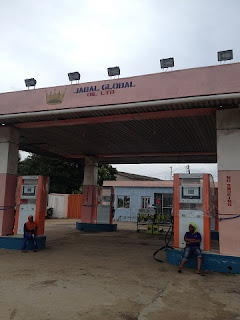 New findings have revealed that the market open price of petrol has hit N160 per litre. This is as a result of the landing cost that is within the region of N138 per litre.
New findings have revealed that the market open price of petrol has hit N160 per litre. This is as a result of the landing cost that is within the region of N138 per litre.